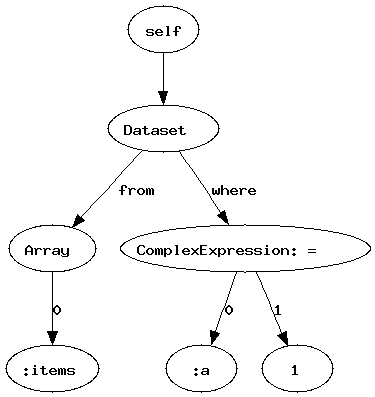New Features¶ ↑
-
Reversible migration support has been added:
Sequel.migration do change do create_table(:artists) do primary_key :id String :name, :null=>false end end end
The change block acts the same way as an up block, except that it automatically creates a down block that reverses the changes. So the above is equivalent to:
Sequel.migration do up do create_table(:artists) do primary_key :id String :name, :null=>false end end down do drop_table :artists end end
The following methods are supported in a change block:
-
create_table
-
add_column
-
add_index
-
rename_column
-
rename_table
-
alter_table (supporting the following methods):
-
add_column
-
add_constraint
-
add_foreign_key (with a symbol, not an array)
-
add_primary_key (with a symbol, not an array)
-
add_index
-
add_full_text_index
-
add_spatial_index
-
rename_column
-
Use of an other method in a change block will result in the creation of a down block that raises an exception.
-
-
A to_dot extension has been added that adds a Dataset#to_dot method, which returns a string that can be used as input to the graphviz dot program in order to create visualizations of the dataset’s abstract syntax tree. Examples:
Both the to_dot extension and reversible migrations support were inspired by Aaron Patterson’s recent work on ActiveRecord and ARel.
-
-
The user can now control how the connection pool handles attempts to access shards that haven’t been configured. The default is still to assume the :default shard. However, you can specify a different shard using the :servers_hash option when connecting to the database:
DB = Sequel.connect(..., :servers_hash=>Hash.new(:some_shard))
You can also use this feature to raise an exception if an unconfigured shard is used:
DB = Sequel.connect(..., :servers_hash=>Hash.new{raise ...}) -
The mysql and mysql2 adapters now both support the :read_timeout and :connect_timeout options. read_timeout is the timeout in seconds for reading back results of a query, and connect_timeout is the timeout in seconds before a connection attempt is abandoned.
Other Improvements¶ ↑
-
The json_serializer plugin will now typecast column values for columns with unrestricted setter methods when parsing JSON into model objects. It now also calls the getter method when creating the JSON, instead of directly taking the values from the underlying hash.
-
When parsing the schema for a model with an aliased table name, the unaliased table name is now used.
-
The SQLite adapter has been updated to not rely on the native type_translation support, since that will be removed in the next major version of sqlite3-ruby.
Sequelnow implements it’s own type translation in the sqlite adapter, similarly to how the mysql and postgres adapters handle type translation. -
On SQLite, when emulating natively unsupported schema methods such as drop_column,
Sequelwill now attempt to recreate applicable indexes on the underlying table. -
A more informative error message is now used when connecting fails when using the jdbc adapter.
-
method_missing is no longer removed from
Sequel::BasicObjecton ruby 1.8. This should improve compatibility in some cases with Rubinius.
Backwards Compatibility¶ ↑
-
On SQLite,
Sequelno longer assumes that a plain integer in a datetime or timestamp field represents a unix epoch time. -
Previously, saving a model object that used the instance_hooks plugin removed all instance hooks. Now, only the applicable hooks are removed. So if you save a new object, the update instance hooks won’t be removed. And if you save an existing object, delete instance hooks won’t be removed.
-
The private Dataset#identifier_list method has been moved into the SQLite adapter, since that is the only place it was used.

